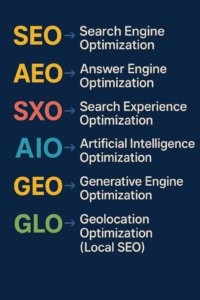The Evolving Landscape of SEO and Web Development
SEO and web development have always gone hand-in-hand in building a successful online presence. Today, the digital ecosystem has evolved — not only do websites need to rank on traditional search engines like Google, Bing, and Yahoo, but also on AI-powered platforms like ChatGPT, ChatSonic, Microsoft CoPilot, and other AI search assistants.
What is SEO in 2025?
Search Engine Optimization (SEO) is the process of optimizing a business, product, or service-based website to appear prominently in search engine results. It includes keyword research, on-page optimization, link building, technical improvements, and content strategy.
But in 2025, SEO isn’t just about keywords anymore — it’s also about how well your site content performs contextually in AI-generated answers.
Web Development and Its Role in SEO
Web development provides the technical foundation for SEO. Clean code, fast-loading pages, mobile responsiveness, and semantic HTML all contribute to a site’s ability to rank well.
If your website is poorly built — slow, broken, or not mobile-friendly — even the best SEO strategy may fail.
Do AI Tools Kill the Need for SEO?
Not at all. It’s a myth that AI has killed SEO or the need for web developers. In fact, AI has made SEO more competitive and smarter.
Now, SEO experts must also consider how AI platforms interpret and display content — meaning structured data, FAQs, conversational tone, and schema markup are more important than ever.
Optimizing for AI Bots and AI Search Results
To stay ahead, websites must adapt by:
Writing conversational, clear, and helpful content
Using structured data (schema.org)
Ensuring fast performance and mobile optimization
Providing direct answers to common queries
AI tools prefer trustworthy, authoritative, and structured content — similar to traditional SEO but with a stronger focus on context and user intent.
The New SEO + Web Dev Synergy
The synergy between SEO and web development has become even more crucial. While the tools and algorithms may change, the core remains the same: creating helpful, accessible, and high-performing websites that users — and now AI — can easily understand and recommend.

